Everything You Need to Know About Absolutely Free Criminal Background Checks
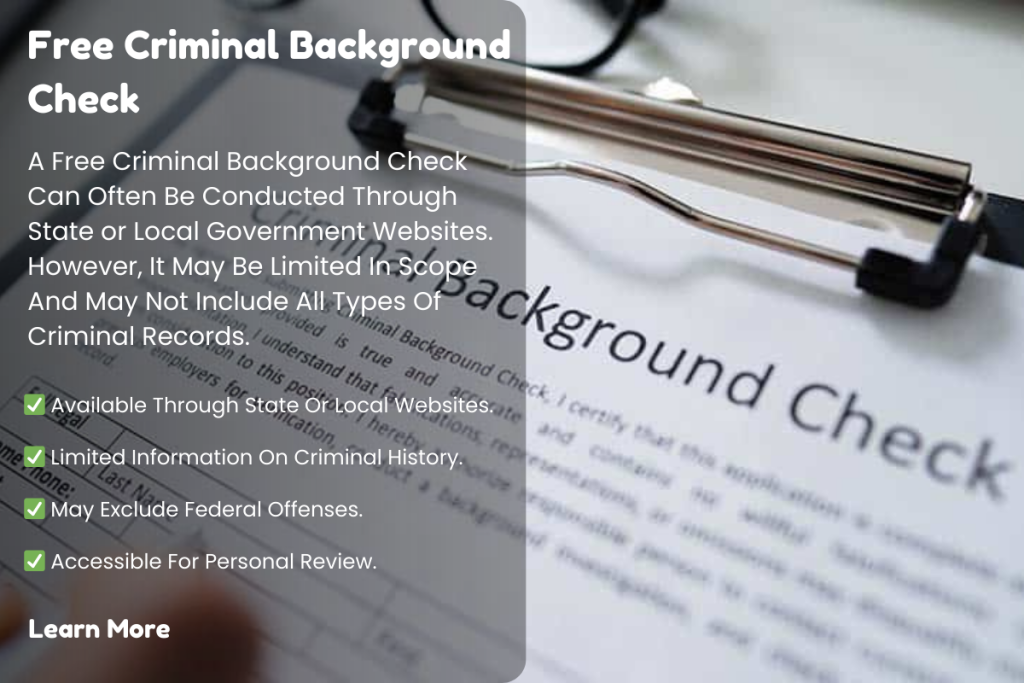
Understanding Absolutely Free Criminal Background Checks
Criminal background checks have become a vital tool in various situations, from personal safety to employment screening. As individuals seek transparency, trustworthiness, and peace of mind, many wonder whether it is possible to obtain a criminal background check without spending a penny. The good news is that absolutely free criminal background checks are available, though they come with certain limitations and considerations. In this article, we will dive deep into what free criminal background checks are, how they work, and where to get them, while also discussing the pros and cons of using such services.
What Is an Absolutely Free Criminal Background Check?
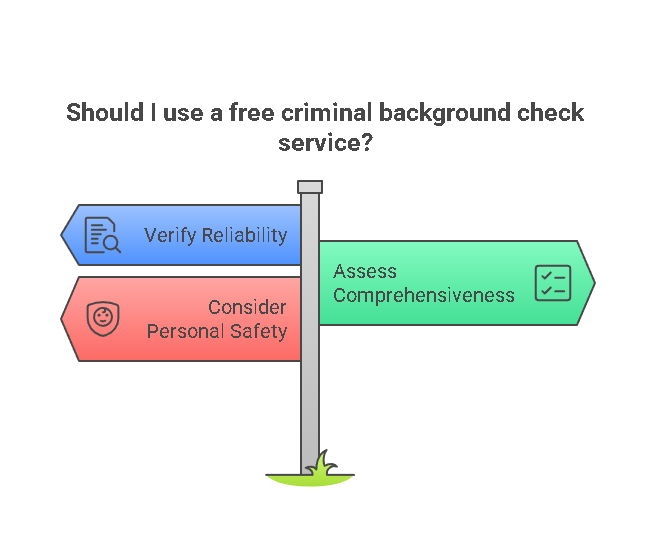
A criminal background check is a process through which an individual’s criminal history is reviewed, typically by checking various databases and public records for any arrests, convictions, or charges. Criminal background checks are often used by employers, landlords, or even individuals who want to ensure a person’s trustworthiness and safety.
An absolutely free criminal background check refers to a service that allows individuals to access certain parts of their criminal history or someone else’s, without incurring any costs. These services are typically limited compared to paid background checks, as they only provide access to specific, publicly available information.
In a typical criminal background check, a wide range of information can be reviewed, including but not limited to:
- Felonies
- Misdemeanors
- Arrest records
- Court judgments
- Sex offender registry status
The major distinction when referring to “absolutely free” criminal background checks is that these services often provide only limited details. The data available is usually pulled from public records, and many times, the information may be incomplete or not up-to-date.
How Do Free Criminal Background Checks Work?
Free criminal background checks primarily work by pulling information from publicly available records. These records can include court documents, police records, and other legal databases that are accessible to the public. Many states in the U.S. have laws that ensure some level of public access to criminal records, and this data can be compiled through various online platforms.
1. The Process: To get an absolutely free criminal background check, an individual usually needs to provide basic identifying details, such as:
- Full name
- Date of birth
- Social security number (in some cases)
- Last known address
Once the necessary details are provided, the background check will typically query available databases such as state or county court records, arrest records, and sex offender registries. Many websites also offer free access to these databases, though it’s important to note that not all records may be included, depending on regional availability or restrictions.
2. Types of Criminal Records Accessed:
- Felonies: More serious criminal offenses that usually result in imprisonment.
- Misdemeanors: Lesser offenses, such as petty theft or disorderly conduct.
- Arrest Records: Instances where an individual has been arrested but not necessarily convicted.
- Court Judgments: Legal outcomes from criminal trials, including acquittals, convictions, or dismissals.
- Sex Offender Registry: Information about individuals who are listed as sex offenders.
Not all free background check services will provide access to all types of records, and some may have significant limitations in terms of the scope of the information offered.
Where to Get an Absolutely Free Criminal Background Check?
While the idea of obtaining a free criminal background check may sound appealing, it’s important to understand that not all sources are equally reliable or comprehensive. Here are a few legitimate options where you can find free criminal background check services:
- Government Websites: Some state and local government websites offer free access to certain public records, including criminal history data. These services are generally trustworthy and ensure that the information is up-to-date. However, the availability of these records can vary from state to state, and they often only provide limited details.
- Court Records: Many county and municipal courts provide free access to basic case information. This can include criminal cases within that jurisdiction. However, it’s essential to note that not all court records are available online, and access may be restricted in some cases.
- Non-Profit Organizations: Some non-profit organizations, particularly those focused on legal advocacy and criminal justice reform, may offer free background checks. These organizations might have specific focuses, such as assisting people who have been wrongly accused or advocating for criminal justice reform.
- Online Databases: Several websites claim to offer free criminal background checks by aggregating public data from various sources. While these services can be convenient, they may not always be reliable, and some may charge hidden fees after providing initial results.
- Sex Offender Registry: The U.S. Department of Justice maintains a free online registry that allows individuals to search for sex offenders within a specific area. This tool is designed for safety purposes and can be accessed by anyone.
However, it is crucial to keep in mind that these free sources often provide incomplete or outdated information. They may not include all criminal records, especially if the case occurred in another jurisdiction or if the records are sealed or expunged.
Pros and Cons of Absolutely Free Criminal Background Checks
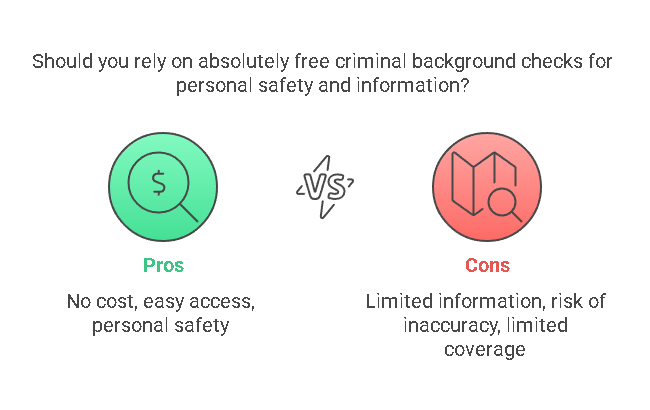
Pros:
- No Cost: The most obvious advantage of a free criminal background check is that it comes at no expense to the user. This makes it an appealing option for individuals who simply want to review their own or someone else’s criminal history.
- Easy Access: Free background checks are often easy to access, with many services providing online platforms where users can search criminal records quickly.
- Personal Safety: If you are concerned about the safety of your home or workplace, conducting a free criminal background check can give you basic insights into the criminal history of individuals you interact with.
Cons:
- Limited Information: Free background checks often provide limited data. For example, they may not include all types of offenses or may not be up-to-date with the most recent records.
- Risk of Inaccuracy: The data provided by free services may not always be accurate. It could be incomplete or outdated, which can lead to misunderstandings or incorrect assumptions.
- Limited Coverage: Free criminal background check services may only cover certain regions or jurisdictions, leaving gaps in the information they provide.
- No Guarantee of Comprehensiveness: Because free services often rely on public records, you may not be able to access critical information such as federal criminal records or data from private databases.
In conclusion, while free criminal background checks can provide basic insights into an individual’s criminal history, they should not be relied upon for comprehensive or official purposes. The limitations in accuracy, coverage, and detail make free services an imperfect solution for most serious inquiries.
Looking for more comprehensive background checks or need a reliable service for employment or legal purposes? Be sure to explore professional services like PreciseHire, which offers thorough and accurate criminal background checks that meet legal standards and ensure peace of mind.
How Accurate Are Free Criminal Background Checks?
While free criminal background checks can be convenient and helpful, they come with a number of limitations that can affect the quality and accuracy of the information they provide. In this section, we will explore these limitations in greater detail, providing you with a clearer understanding of how accurate free criminal background checks are and why it’s important to rely on more comprehensive services when it comes to making important decisions based on criminal history.
Limitations of Free Criminal Background Checks
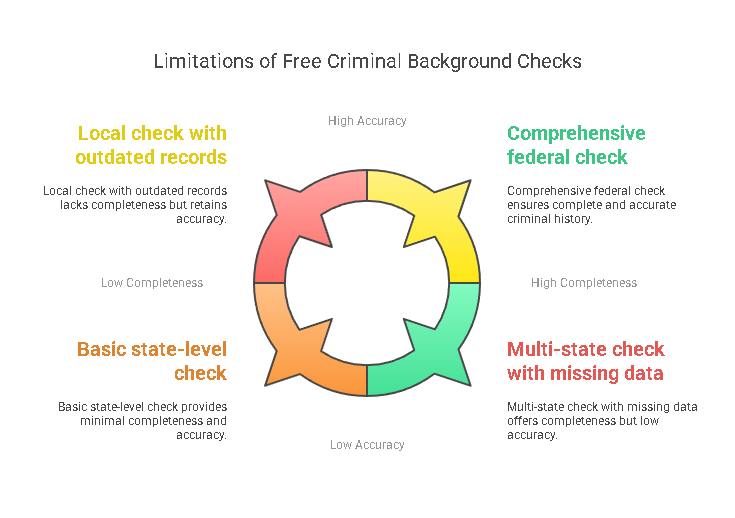
1. Incompleteness of Information
One of the major drawbacks of free criminal background checks is that they are often incomplete. These services may only pull data from publicly accessible records, but criminal records are spread across multiple databases and jurisdictions. For example, free services might focus on state or county-level records, leaving out federal records or information from private databases that may contain crucial data about an individual’s criminal past.
The lack of access to a comprehensive set of data sources means that many free background checks miss critical pieces of information. For instance, a person who has been arrested in one state but convicted in another may not have all their records available through a free service. This can create a skewed view of their criminal history and lead to inaccurate conclusions.
2. Outdated or Inaccurate Information
Another issue with free criminal background checks is that they may contain outdated or inaccurate data. Public records are not always updated in real time, and many free services rely on older databases that may not reflect recent changes to an individual’s criminal record. For example, if someone was arrested years ago but their case was recently dismissed, a free service might still show the old arrest record without noting the dismissal.
Additionally, free services may not always have access to the most current court judgments, especially if they rely on local records that are only updated periodically. The information provided by a free check could be months or even years out of date, which can be particularly problematic when used for critical decisions like hiring or leasing.
3. Limited Data Sources
Free criminal background check services typically query only a limited set of data sources, which can result in missing information. For instance, these services may only have access to state or county-level criminal records and may not be able to pull data from national criminal databases or private records. Federal convictions, arrests in other states, or cases that are handled by private companies may not appear in a free background check report.
Moreover, many free services may not provide information on more specific offenses, such as juvenile records or sealed/expunged records, which are typically harder to access but may still be crucial in some situations. This lack of comprehensiveness can make free background checks unreliable for serious decision-making, such as employment or legal purposes.
4. Regional Limitations
The effectiveness of a free criminal background check can vary significantly depending on where the individual in question has lived or committed offenses. Since criminal records are often maintained by local jurisdictions (i.e., states and counties), a free background check service may only have access to records from a specific region. This means that if an individual has lived in multiple states or counties, a free check might miss key records from other locations.
For example, a person might have been convicted of a crime in one state but moved to another. If the free service doesn’t query both states, the report will only show criminal records from the region that was included in the check. This can lead to an incomplete picture of an individual’s criminal history.
Can Free Criminal Background Checks Be Used for Employment Screening?
While free criminal background checks may seem like an attractive option for employers looking to screen candidates without incurring extra costs, they are not recommended for employment purposes. Here are some key reasons why:
1. Risk of Legal Issues
Employers must comply with the Fair Credit Reporting Act (FCRA) and various state laws when using criminal background checks for employment decisions. The FCRA requires that employers obtain written consent from candidates before running a background check and allows applicants to dispute any inaccuracies in the report. Free background check services may not meet these legal standards, putting employers at risk of violating the law.
For example, free services might not comply with regulations regarding the use of sealed or expunged records, which can lead to legal complications. If an employer bases a hiring decision on inaccurate or incomplete information from a free check, they could face lawsuits or other legal actions.
2. Incompleteness and Lack of Detail
As previously mentioned, free criminal background checks are often incomplete, which can lead to gaps in the information provided to employers. When employers are evaluating a candidate, they need access to comprehensive and detailed information to make informed decisions. Free services simply don’t provide this level of thoroughness.
For example, a free check might show only misdemeanor offenses, but it may fail to provide information on felony convictions, federal crimes, or offenses from other states. Employers relying on incomplete information risk overlooking serious criminal history that could affect their decision to hire an individual.
3. Non-Compliance with State and Federal Regulations
Using a free background check service can also lead to non-compliance with state and federal laws regarding criminal records. Many states have laws that govern how and when criminal history information can be used in employment decisions. For example, some states may require that only convictions from the past seven years be considered, while others may prohibit discrimination based on certain types of criminal records.
Free services may not have the necessary features to ensure compliance with these regulations. Without the ability to filter out records that are not relevant or legally usable, employers risk making hiring decisions that could expose them to lawsuits or regulatory fines.
Why Consider Professional Services Like PreciseHire for Criminal Background Checks?
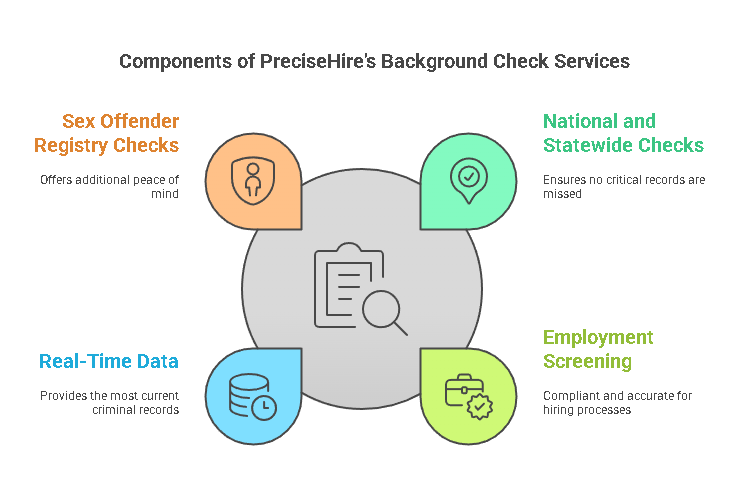
Given the limitations of free criminal background checks, employers and individuals seeking comprehensive and reliable results should consider using professional background check services like PreciseHire. PreciseHire provides a variety of background check services that ensure thoroughness, accuracy, and compliance with legal standards. Let’s take a look at how PreciseHire stands out:
PreciseHire’s Comprehensive Services
PreciseHire offers a full range of criminal background check services, including:
- National and Statewide Criminal Record Checks: PreciseHire queries both state and federal databases to provide a complete picture of an individual’s criminal history, ensuring that no critical records are missed.
- Employment Screening: Employers can use PreciseHire’s services to conduct compliant and accurate criminal background checks as part of their hiring process. The service ensures adherence to FCRA regulations and state-specific laws.
- Real-Time Data: PreciseHire’s platform provides real-time data that reflects the most current criminal records, so employers and individuals can make informed decisions based on accurate, up-to-date information.
- Sex Offender Registry Checks: PreciseHire checks national and state sex offender registries to provide additional peace of mind for employers and individuals.
Why Choose PreciseHire?
PreciseHire goes beyond the limitations of free background check services by offering the following advantages:
- Accuracy and Reliability: PreciseHire ensures that the information provided is comprehensive, accurate, and legally compliant.
- Thoroughness: Unlike free services, PreciseHire covers federal, state, and local criminal records, ensuring that no information is overlooked.
- Legal Compliance: PreciseHire’s services are fully compliant with the FCRA, state laws, and industry standards, making it a trustworthy choice for employers and individuals.
- User-Friendly Platform: PreciseHire offers a seamless and intuitive platform, making it easy for individuals and businesses to obtain background checks quickly and efficiently.
PreciseHire is the ideal solution for anyone seeking reliable, comprehensive, and legally compliant criminal background checks. Whether you’re screening candidates for employment or conducting personal inquiries, PreciseHire ensures that you have access to the most up-to-date and accurate information available.
Legal Aspects, FAQs, and Conclusion
Understanding the legal framework surrounding criminal background checks is crucial, especially when it comes to using these checks for employment, housing, or other important decisions. In this section, we’ll explore the legal considerations when using criminal background checks, answer frequently asked questions, and conclude by reinforcing the importance of choosing professional services like PreciseHire.
Legal Aspects of Criminal Background Checks
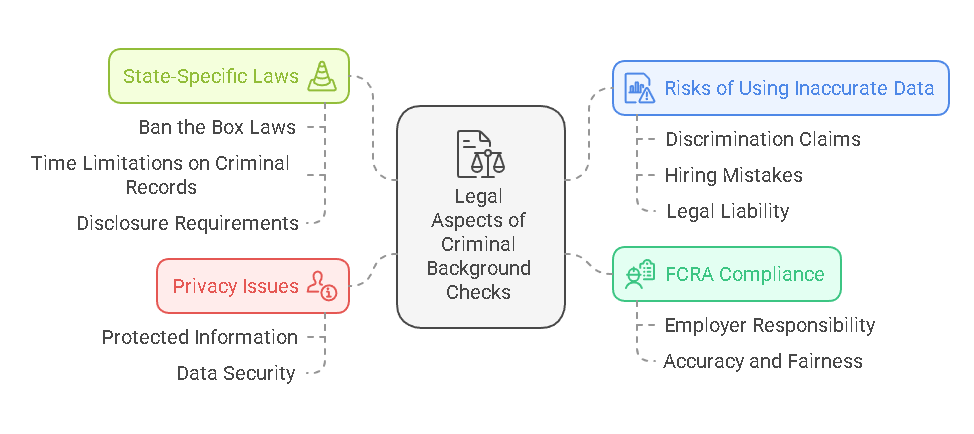
When conducting criminal background checks, whether free or paid, it’s essential to be aware of the legal regulations that govern their use. These regulations ensure that individuals’ privacy is protected, and employers and other entities use the information fairly and responsibly. Here are some key legal aspects to consider:
1. FCRA Compliance
The Fair Credit Reporting Act (FCRA) is a crucial piece of legislation that governs the use of background checks for employment purposes. It establishes guidelines to protect consumers’ rights and ensures that background checks are used responsibly.
- Employer Responsibility: Under the FCRA, employers must obtain written consent from candidates before conducting a criminal background check. The individual must also be informed if the information in the report could affect their hiring decision. If an employer decides not to hire a candidate based on information found in the background check, the employer must provide the candidate with a copy of the report and allow them the opportunity to dispute any inaccuracies.
- Accuracy and Fairness: The FCRA requires background check companies to provide accurate information and gives consumers the right to dispute any incorrect details in their report. If a free background check service does not provide accurate data or fails to meet the FCRA’s standards, it can put employers at risk of legal challenges.
2. Privacy Issues
Privacy is a key concern when conducting background checks. Various laws are in place to protect an individual’s personal information, especially when it comes to sensitive data like criminal records.
- Protected Information: Certain criminal records, such as sealed or expunged records, are protected by privacy laws. These records cannot be disclosed unless specific conditions are met. Free background check services may not be able to access this protected information, or they may incorrectly include it in reports.
- Data Security: Paid services like PreciseHire adhere to strict data security protocols to protect the personal and sensitive information they handle. Free services may not provide the same level of data protection, increasing the risk of misuse or unauthorized access to sensitive data.
3. State-Specific Laws
Criminal background check laws vary by state, so it’s important to understand the specific regulations in your state or jurisdiction. Some key state-specific considerations include:
- Ban the Box Laws: Many states have passed “ban the box” laws, which restrict employers from asking about criminal history on job applications. These laws are designed to give individuals with criminal records a fair chance at employment. However, these laws vary by state, and employers must ensure compliance when conducting background checks.
- Time Limitations on Criminal Records: Some states have laws that limit how far back a background check can go when considering criminal convictions. For example, in some states, convictions older than seven years may not be used in hiring decisions. Free background check services may not always account for these limitations, making it essential for employers to use comprehensive, paid services that filter out irrelevant or outdated information.
- Disclosure Requirements: Some states require that individuals be notified if their criminal background check will be used in employment decisions, giving them the opportunity to challenge inaccuracies. Paid services like PreciseHire ensure that these disclosures are handled properly.
4. Risks of Using Inaccurate Data
Using inaccurate or incomplete data from free criminal background check services can lead to a number of legal risks:
- Discrimination Claims: Employers who rely on inaccurate information to make hiring decisions may face discrimination lawsuits. For example, if a free service shows an arrest record that was later expunged, an employer might inadvertently disqualify a candidate based on outdated or incorrect data.
- Hiring Mistakes: Inaccurate criminal background checks can also result in poor hiring decisions. Employers might overlook candidates who are qualified due to incorrect or incomplete records, or they might hire someone with a criminal history that poses a risk to their business or workplace.
- Legal Liability: Both employers and individuals may be held legally liable for the improper use of criminal background check information. To avoid this, it’s essential to use reliable, accurate, and legally compliant services for background checks.
Frequently Asked Questions (FAQs)
How can I get an absolutely free criminal background check for myself?
To get a free criminal background check, you can use publicly available records such as court records, state and federal databases, and government websites. However, these free checks may be incomplete, outdated, or missing critical information. For a more thorough background check, consider using a professional service like PreciseHire.
Are free criminal background checks accurate?
Free criminal background checks may not always be accurate. They often rely on incomplete or outdated data, and they may not cover all necessary databases (e.g., federal records, private databases). For accurate and up-to-date information, it is recommended to use paid services like PreciseHire.
Can I use a free criminal background check for employment screening?
Free criminal background checks should not be used for employment screening. They may be incomplete or inaccurate, which can lead to legal issues and poor hiring decisions. Employers should use comprehensive, paid services that comply with the FCRA and state-specific laws.
How far back do free criminal background checks look into my history?
The time frame of a free background check depends on the service provider and the data sources they query. However, free checks typically do not go as far back as paid services, and they may exclude certain records, such as federal offenses or sealed cases. For a more complete picture, professional services are recommended.
What should I do if my free criminal background check shows incorrect information?
If a free criminal background check shows incorrect information, you should contact the service provider and request a correction. If the error affects employment or other important decisions, you can also dispute the information through the relevant legal channels, such as under the FCRA.
Conclusion
Criminal background checks are an essential tool for making informed decisions in areas like employment, housing, and personal safety. While free services may provide a basic snapshot of someone’s criminal history, they often come with significant limitations, including incomplete records, outdated information, and a lack of access to critical data sources. Free background checks should not be relied upon for important decisions, especially in legal or employment contexts.
For accurate, comprehensive, and legally compliant background checks, consider using a professional service like PreciseHire. By choosing a trusted provider, you can ensure that the information you rely on is accurate, up-to-date, and compliant with all relevant laws and regulations. This is especially important when making decisions that could have long-term consequences for you or your business.
